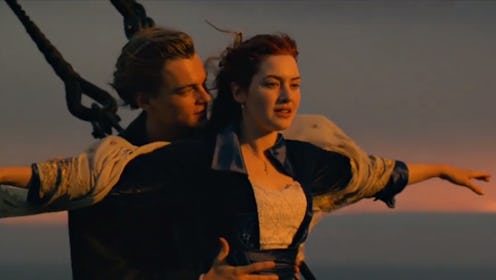Entertainment
Céline Dion Has Weighed In On The Controversial 'Titanic' Ending Once & For All

Another prominent Titanic figure has weighed in on the film’s controversial ending. Céline Dion has settled the Titanic door debate once and for all. Dion, whose famed track “My Heart Will Go On” is featured prominently in the 1997 film, appeared on The Tonight Show Starring Jimmy Fallon on Nov. 15, and offered her take on Jack's (Leonardo DiCaprio) fate. In James Cameron’s drama romance about the ill-fated voyage of the R.M.S. Titanic that killed thousands upon its collision into an iceberg in 1912, Rose (Kate Winslet) survived the entire ordeal while propped on a floating door. Jack, on the other hand, sank to the bottom of the cold North Atlantic waters.
While at first hesitant to address the controversial ending, Dion inevitably shared her thoughts on whether Jack could have fit on the door and survived. “First of all, if you look closely to the picture, Rose is maybe dead or totally frozen and she’s not quite all there,” she said. “Second of all, he doesn’t need an invitation."
Dion continued, “Come on, baby! Make yourself comfortable. Jump in. And then, who did not think about this guy who is in the middle of the frozen ocean, and that maybe his body is so frozen that he didn’t have the strength to jump in for [his] love?”
The subject of Jack’s fate has long been a source of controversy among movie-goers. As such, it has been debated time and time again. In 2002, MythBusters actually proved theories of Jack’s survival via scientific approach and concluded that both Jack and Rose could have survived had he actually joined his beloved on the floating door — especially if they had the forethought to use Rose's life-jacket as a buoy.
As for the film’s director, Cameron wants fans to get over it already. In an interview with Vanity Fair ahead of the film’s 20th anniversary in November 2017, Cameron said the film would have been “meaningless” if Jack survived. “The film is about death and separation. He had to die,” he said. “I think it’s all kind of silly that we’re having this discussion 20 years later. But it does show that the film was effective in making Jack so endearing to the audience that it hurts them to see him die.”